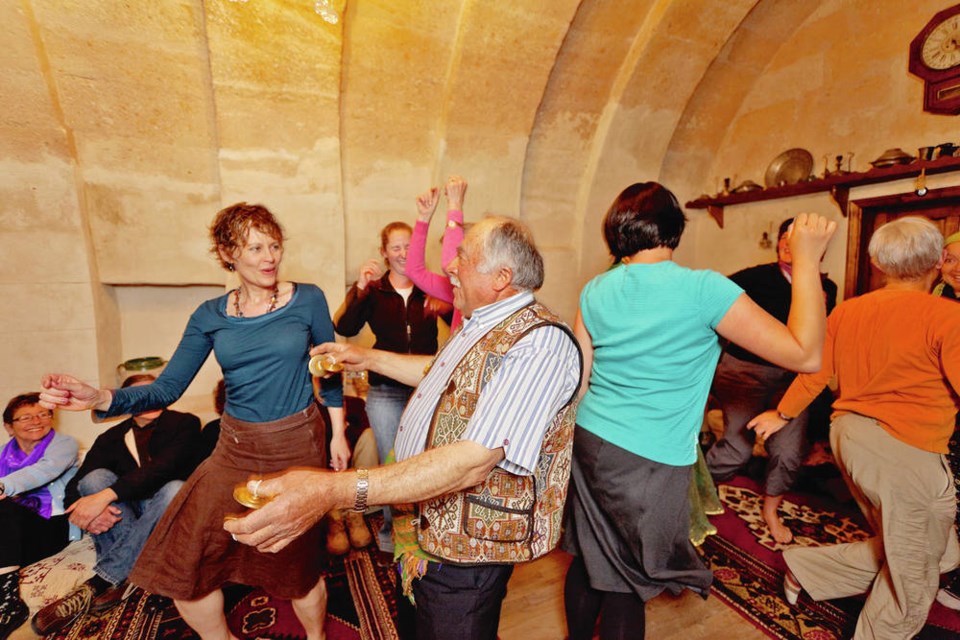As we’ve had to postpone our travels because of the pandemic, I believe a weekly dose of travel dreaming can be good medicine. Here’s a reminder of the fun that awaits us in Europe at the other end of this crisis.
I’m in northeastern Turkey, the world’s top hazelnut-producing region and home of the Laz people. It’s located along the Black Sea coast, where it rains 320 days a year. Yet I’m enjoying an enthusiastic welcome, discovering that the locals ambush visitors with unforgettable warmth and a wide-eyed curiosity.
My tour group, which includes 22 American travellers and a Turkish co-guide, has been invited to spend an evening and a night with a Laz family — actually the families of three brothers, who all live in one large three-story house provided to them by their elderly parents. We are the first Americans that the 16 people who live there have ever seen in the flesh. They ask us to make ourselves comfortable. Adding our shoes to the pile by the door creates a thought-provoking commotion of high-tech American travel gear mixing it up with woven village footwear. Overlapping carpets are warm under our feet, giving the place a cozy bug-in-a-rug feel.
We are treated to a feast. As American visitors, we’re elevated to a kind of royal status. Only the older men eat with us as women serve and teens peek curiously from just outside the doors. Meanwhile, the little kids frolic freely, as if we were from just next door. The bread is fresh from the oven and hearty. The meat is dark and abundant — as if serving it is showing off wealth. And the salad puts me in that awkward space of not wanting to disappoint my hosts while not wanting to upset my stomach. As we praise the stuffed peppers, members of our group — in anticipation of tummy troubles later — discreetly pass Pepto-Bismol tablets around under the table. The pouring tea doesn’t quite mask the sound of ripping cellophane.
We enjoy some conversation as our meal digests. Having an interpreter helps with communication here, but it’s not required. Somehow, communication happens. Many younger Turks speak English and many older Turks, having worked in Germany, speak German. Especially in small towns, their curiosity and eagerness to connect makes the language barrier fun to hurdle. If Turkish sounds tough, remember, it’s the same in reverse. Certain sounds, like our “th,” are tricky. (My friend Ruth is entertained by the tortured attempts Turks make at pronouncing her name: “Woooott.”) Any English-speaking Turk can remember spending long hours looking into the mirror like a wide-mouth frog, slowly enunciating: “This and these are hard to say. I think about them every day. My mouth and my teeth, I think you see, help me say them easily.”
After dinner, we pay our respects to the frail, bedridden grandma, looking like a veiled angel in white. She and her family know she will soon succumb to her cancer. But for now, she is overjoyed to see such a happy evening filling her family’s home.
When we wonder about the wisdom of having an extended family under one roof, one of the sons says, “If a day goes by when we don’t see each other, we are very sad.” The three brothers married three sisters from a single family so that they would share the same in-laws — and assure harmony in the family. They also assure us that entertaining our group of 22 is no problem. If we weren’t here, they’d invite just as many of their neighbors in for dinner.
No Turkish gathering is complete without dancing. Anyone who can snap fingers and swing a Hula-Hoop can be comfortable on the living-room dance floor of new Turkish friends. Two aunts, deaf and mute from meningitis, bring the house down, with their shoulders fluttering like butterflies. We dance and talk with four generations until after midnight.
Stepping out into the late-night breeze, I notice that what had seemed to be just a forested hillside during the day is now a spangled banner of lights, each representing a Muslim home filled with as many family values as the one we joined this evening. So much for the stereotypical image of fanatical Muslim hordes embraced by my TV-addicted neighbours back home with no passports.
Standing alone on that perch, it occurs to me that by venturing beyond our comfort zones, we can realize that our world is filled with joy, with love, with good people, and — in the case of this trip — warm Turkish Laz-pitality.
This article was adapted from Rick’s new book, For the Love of Europe.
Rick Steves () writes European guidebooks, hosts travel shows on public TV and radio, and organizes European tours. You can email Rick at [email protected] and follow his blog on Facebook.



